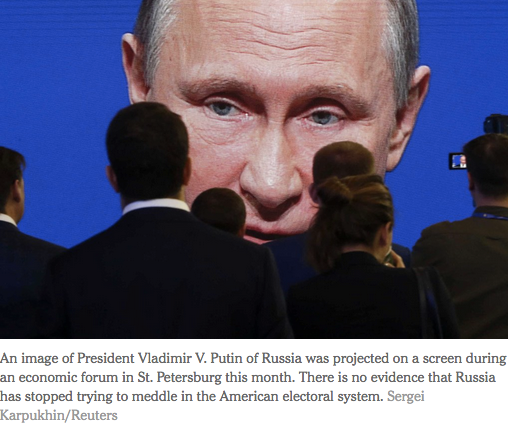WASHINGTON — Lost in the showdown between President Trump and James B. Comey that played out this past week was a chilling threat to the United States. Mr. Comey, the former director of the F.B.I., testified that the Russians had not only intervened in last year’s election, but would try to do it again.
“It’s not a Republican thing or Democratic thing — it really is an American thing,” Mr. Comey told the Senate Intelligence Committee. “They’re going to come for whatever party they choose to try and work on behalf of. And they’re not devoted to either, in my experience. They’re just about their own advantage. And they will be back.”
What started out as a counterintelligence investigation to guard the United States against a hostile foreign power has morphed into a political scandal about what Mr. Trump did, what he said and what he meant by it. Lawmakers have focused mainly on the gripping conflict between the president and the F.B.I. director he fired with cascading requests for documents, recordings and hearings.
But from the headquarters of the National Security Agency to state capitals that have discovered that the Russians were inside their voter-registration systems, the worry is that attention will be diverted from figuring out how Russia disrupted American democracy last year and how to prevent it from happening again. Russian hackers did not just breach Democratic email accounts; according to Mr. Comey, they orchestrated a “massive effort” targeting hundreds of — and possibly more than 1,000 — American government and private organizations since 2015.
. . .
“This is part of what the Russians call ‘new generation warfare,’” Heather A. Conley, a scholar at the Center for Strategic and International Studies and an author of “The Kremlin Playbook,” said Thursday. “It’s a strategy of influence, not of brute force.”
The strategy’s central concept, she said, refined in attacks on Eastern European countries, is that it is “better to collapse a country from within.”
Eric S. Edelman, who was an under secretary of defense under President George W. Bush, said Russian information warfare capabilities were highly developed. “In the Cold War, the Soviet efforts in this regard were ham-handed and could be countered with relative ease,” he said. “Today, the Russians are much more sophisticated, and they see things like disinformation, propaganda and what we used to call ‘active measures’ as part of a suite of capabilities.”
. . .
But few doubt that the Russians have concluded that their attack on the American system was successful beyond their dreams — they started a scandal that has consumed the American political process.
“They can win two ways,” Senator Sheldon Whitehouse, a Rhode Island Democrat who has been investigating the election hacking through the Senate Judiciary Committee, said Thursday. “They can do it” trying to influence votes, “or they can get caught doing it,” and undercut confidence in the American electoral system.




